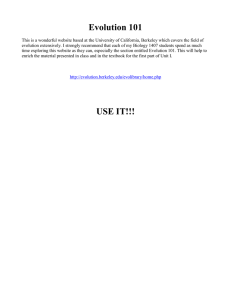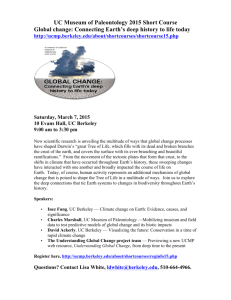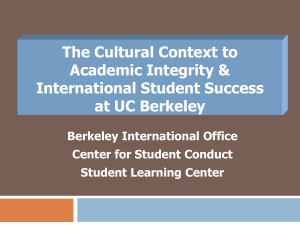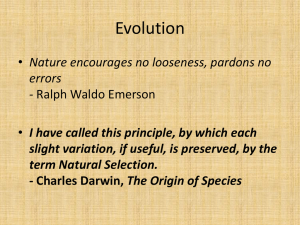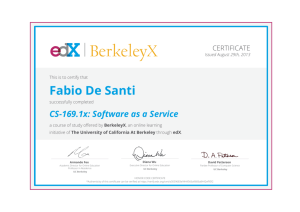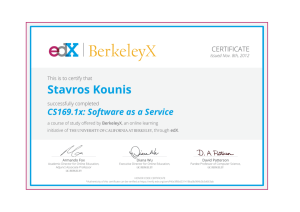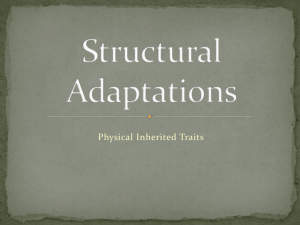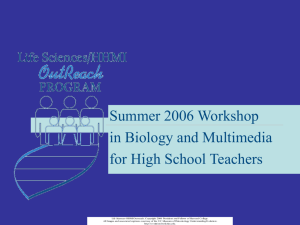Evidence Presentations
advertisement
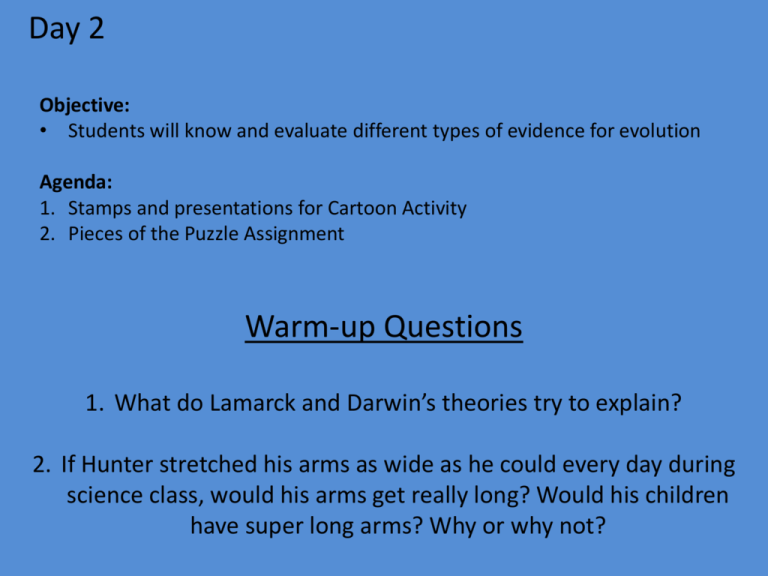
Day 2 Objective: • Students will know and evaluate different types of evidence for evolution Agenda: 1. Stamps and presentations for Cartoon Activity 2. Pieces of the Puzzle Assignment Warm-up Questions 1. What do Lamarck and Darwin’s theories try to explain? 2. If Hunter stretched his arms as wide as he could every day during science class, would his arms get really long? Would his children have super long arms? Why or why not? Topics DNA Vestigial structures Homologous structures Fossils Biogeography Embryology Scoring Rubric 1 2 3 Appearance Includes a limited amount of information that is poorly presented with limited verbiage and visuals Includes information and explanations that may be somewhat inaccurate and a limited number of effective visuals Includes complete, accurate information and explanations with exemplary visuals Example Includes 0-1 example that is not accurate, relevant or connected to the topic. Includes only one example that is only partially accurate, relevant or connected to the topic. Includes at least one example that is accurate, relevant and whose connection to the topic is explicit. Quiz Questions Includes 0-5 questions are appropriate, relevant or suitable for the class. Includes 3-5 questions may not be appropriate, relevant to the topic or a suitable difficulty level. Includes 5 questions that are appropriate, relevant to the topic, and suitable difficulty level. Online resources • Initial Background Information: – Textbook 15-3 (pg 378) – http://en.wikipedia.org/wiki/Evidence_of_evolution • Evolution 101 website: – http://evolution.berkeley.edu/evosite/lines/index.shtml – http://evolution.berkeley.edu/evolibrary/search/topics.php?topic_id=14 – http://evolution.berkeley.edu/evolibrary/search/topicbrowse2.php?topic_id=46 • Potentially helpful online resources: – – – – – – – http://www.evoedu.com/evidence.html http://bioweb.cs.earlham.edu/9-12/evolution/index.html http://anthro.palomar.edu/evolve/evolve_3.htm http://www.ucmp.berkeley.edu/education/explorations/tours/stories/middle/C7.html http://www.ucmp.berkeley.edu/education/explorations/tours/fossil/9to12/intro.html http://www.zoology.ubc.ca/~bio336/Bio336/Lectures/Lecture5/Overheads.html http://www.scientificamerican.com/article.cfm?id=shaking-the-family-tree Day 3 Objective: • Explain how multiple lines of scientific evidence support biological evolution Agenda: 1. Great Fossil Find 2. Evidence Presentations (two sections) 3. NOVA Activity Warm-up 1. Define evolution 2. How would Darwin explain the fact that foxes in Alaska are white, while foxes in Oregon are brown? (Use words and/or pictures to illustrate your answer) Great Fossil Find 1. By looking at your final bone configuration, what would you say about how and where this animal lived? 2. Did the information from other groups or the booklet influence your final decision? 3. Did your interpretation of the bones change as you got more information? 4. How is this activity like our evidence for evolution posters? Nova Activity 1. List five Nodnol traits in your notebook 2. Cut out all 12 Nodnols 3. Place them in order you think they evolved 4. Defend your choice in your notebook. What evidence or specific traits support your idea? 5. Does the fact that “complex” Nodnols exist mean that the “simple” Nodnols went extinct? Explain your answer. Exit Ticket Explain how each of the topics supports the theory of evolution. Use an example if applicable. • • • • • • Fossils: Vestigial structures: Homologous structures: DNA: Embryology: Biogeography:
